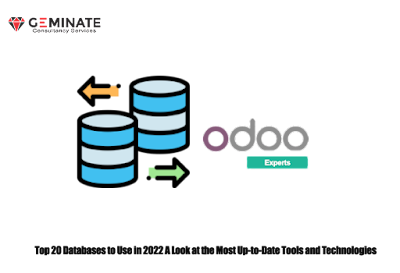The Importance of Having a Reliable Database System
In today's era of digital transformation, database management system software is critical. These days, it's critical to maintain track of all the data acquired by numerous organizations and for various projects. The Database Management System Software is used to keep track of all the processes that take place in a company.
A database management system (DBMS) often includes features for creating, managing, maintaining, querying, updating, and retrieving data records from a database. There are numerous different databases that businesses utilize, but they all have one thing in common: they must be reliable.
The Importance of Databases in Business
The concept of data has not only given businesses new depths, but it has also made operations more difficult. Precise recording and monitoring, on the other hand, can assist firms in tackling these issues by providing them with the information they want for effective business management.
For any firm with multiple data sets to manage, database management solutions are a must-have. These tools connect users to their respective databases and enable quick access, allowing them to acquire what they need, when they need it!
Implementing such technologies improves a company's performance while also reducing the expenses of managing massive datasets.
Depending on the demands of the firm, a database management system might incorporate a wide range of functionality. It will, for example, have general ledger modules for accounting and interface programmers to make interacting with other systems easier. The best database management solutions are those that are suited to your specific requirements and objectives.
The data stored in a database must be secured so that it cannot be accessed by an unauthorized user. This is accomplished by assigning passwords to users or limiting database rights so that only specific people have access to it.
WOULDN'T YOU LIKE TO KNOW?
For the year 2022, the global market for database management systems (DBMS) is expected to be worth nearly $79.2 billion. It is expected to reach $125.6 billion by 2026, growing at a 16.3 percent CAGR during that time.
Which Database Will Be the Most Effective in 2022?
Data is an essential component of our daily lives. It is used in everything from social media to how we work, what we watch on TV, and how we live. Data has also become a commodity in and of itself, with many businesses spending more money on data storage than on anything else.
As a result, businesses are constantly looking for ways to stay ahead of the competition by collecting high-quality data at a faster rate and at a lower cost. Database systems are one way they accomplish this. The top 20 database systems to use in 2022 will be identified in this article.
Oracle
Oracle is a well-known database management system that is gaining traction due to its scalability and high performance. It is written in assembly languages such as Java, C, and C++, and it includes a widely used RDBMS. It takes up less space than other databases and processes data faster.
Oracle is still a popular database. According to experts who are keeping a close eye on this space, the most recent release (21C) has added many innovative features that make it an appealing option for future use!
MySQL
MySQL is a tried-and-true database that is in high demand as web developers seek stability, robustness, or maturity. MySQL is written in C and C++, and the most recent database version is 8.0.
MySQL quickly gained traction in the industry and community due to its enterprise features, flexible license (GPL), and upgraded commercial versions. It is one of the most popular solutions for web development.
MySQL powers Facebook, the world's most popular social media site, which has over 3 billion users.
MySQL was discovered to be the most popular database for 2021 in a survey conducted by Stack Overflow Developer Survey 2021
MS SQL Server
According to a survey, 1056 companies, including Accenture, Hepsiburada, and Microsoft, use Microsoft SQL Server in their tech stacks.
Microsoft SQL Server is an excellent choice for environments requiring high performance and a wide range of features. It can be used in any corporate environment for a variety of purposes, such as business intelligence or analytics applications, giving you greater insight into your company's performance while spending less time on time-consuming tasks. Microsoft SQL Server comes in a dozen different editions, each catering to a different audience and workload.
The Popularity of Microsoft SQL Server
PostgreSQL
PostgreSQL is hard to beat when it comes to enterprise-level database management. It offers a wide range of complex requirements in one package, with an easy learning curve and support beyond standard functions!
PostgreSQL was originally known as POSTGRES, and it was developed at the University of California, Berkeley.
PostgreSQL is one of the most advanced open-source databases, thanks to its long history and ability to grow.
Even before Oracle, Postgres was the first database management system to implement Multi Version Concurrency Control (MVCC). It is the most advanced database system and is highly recommended, especially for organizations that prefer to use freeware and open source software such as Odoo.
Mango DB
In 2021, MongoDB will be the most popular database to use. It was released in 2009, and it is considered difficult for object-oriented languages such as RDBMS (Relational database management system) because they store data in a different way. Thus, with the introduction of MongoDB, dealing with document-type data has become simple, with no need for additional applications on top!
IBM DB2
IBM's cutting-edge platform is AI-powered and designed to deliver data anywhere it is needed. Its proven enterprise-ready features enable you to gain insights quickly while saving money thanks to its multimodal capabilities, which eliminate the need for replicas or migrations.
A flexible foundation powered by modern technologies enables customers to access all aspects of their business at the same time, without the need for multiple systems.
The number of databases for mobile apps has grown significantly in recent years, with the most recent release from IBM being DB2 11.5, which speeds up query execution by utilizing object-relational features such as JSON or XML data types to optimize performance on various platforms such as Windows, Linux, and Unix Systems!
Redis
Redis is an open-source, in-memory data store that can be used as a database as well as a caching system. Strings, lists, hashes, sets sorted sets with range queries, geospatial indexes, bitmaps, hyper logs, and streams are among the structures available.
ElasticSearch
Elasticsearch is a full-text search engine that, thanks to its automatic sharing feature and API, can easily handle horizontal scalability. It is capable of, as well as eager for, all types of data – whether it is logging or monitoring numbers!
Cassandra
Cassandra can handle massive amounts of data with ease thanks to its open core architecture and comprehensive column store features. Because of its ability to withstand failures, this database management software has become a popular option in industries across many sectors, making it ideal when faced with faults or even large amounts of traffic on your site.
MariaDB
MariaDB is a Relational Database Management System (RDBMS) that works with the MySQL protocol. It can be used to seamlessly replace your MySQL server with no code changes! MariaDB is a more community-oriented database than MySQL. The Maria database uses a network architecture that combines columnar storage with massively parallel distributed data, making it faster and easier to work with large amounts of data.
Orient DB
OrientDB is a graph database management solution that allows businesses to leverage the power of NoSQL without having to build multiple systems to handle all of their data types. It also enhances performance, security, and scalability by supporting multiple models such as key-value or object-oriented databases!
SQLite
SQLite is a small and simple database that does not require any installation or configuration. It shares many features with other popular databases such as MySQL, making it an excellent choice for web development such as React Native.
DynamoDB
It is Amazon's new non-relational database, which is server less in nature. It also includes built-in security to protect your data and caching capabilities to improve performance while keeping the information fresh without rewrites. Finally, its consistent latency ensures quick response times regardless of the type or scale of request!
Neo4j
Neo4j is a graph database that queries relationships using the Cypher language. The system has been dubbed "the most efficient and expressive way" of describing these queries, allowing it to be quick in fast-paced environments where other methods would take too long or provide insufficient information about what is required from your data set.
Firebird SQL
Firebird is a free SQL relational database management system that runs on Mac OS X, Linux, Microsoft Windows, and a number of Unix platforms. With its memberships, this basic DBMS solution has upgraded the multi-platform RDBMS to sponsor commitments for all types of financing options!
Microsoft Azure
Microsoft has launched Azure SQL Database, a new managed database service for their cloud platform. It handles all scaling, backup, and high availability requirements that may arise when using internally developed software.
TeamDesk
TeamDesk is a web-based database platform that enables you to work with data, organize, and store information in your daily tasks. You can create a one-of-a-kind solution by customizing per-defined templates or developing one from scratch if you lack programming skills! With Team Desk's unlimited records & storage features, anyone from small businesses to large industries can gain access to the tools they require when managing anything related to business practices.
InterBase
The InterBase database system is a versatile and user-friendly database that can be easily embedded in applications. Its encrypted nature makes it secure, allowing you to access it from anywhere on any device or platform without difficulty! The performance of this software is heavily dependent on its versatility; as such, databases should be able to work across multiple platforms such as Android, Windows, Linux, and so on.
CouchDB
CouchDB is an open-source document database that does not use tables to store data. Instead, for storage purposes, each CouchDB document retains its schema and integrity by using JSON formatting.
SAP HANA
It is a high-performance in-memory database that offers advanced analytic on multi model data both on-premises and in the cloud.
SAP HANA is a powerful engine with cutting-edge features that can handle massive amounts of complex queries.
Frequently Asked Questions
What exactly is a database?
A database is a collection of structured data that can be accessed using queries. Queries enable users to search for specific information and have it returned in one or more formats.
What are the most well-known databases?
The most popular databases are MySQL, PostgreSQL, MariaDB, Oracle Database, and Microsoft SQL Server.
What are the advantages of databases?
The advantages of a database include ease of access, information security, data sharing, integrity, privacy, backup, recovery, and data consistency.
Furthermore, databases can be created for a variety of purposes, such as storing information about customers, inventory, company structure, and so on.
What are the disadvantages of databases?
Database systems are difficult, time-consuming, and complex to design. In addition, converting your file-based system into a database platform incurs significant hardware and software start-up costs.
Who should use a database in their company?
A database is a fantastic tool for any business owner to have. It can assist you in storing data in an organized manner for future reference. You may also need to use it to make decisions about the future direction of your business or to keep track of current trends.
Via Ref Link :



No comments:
Post a Comment